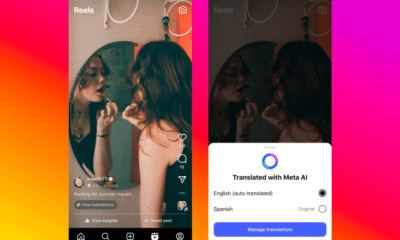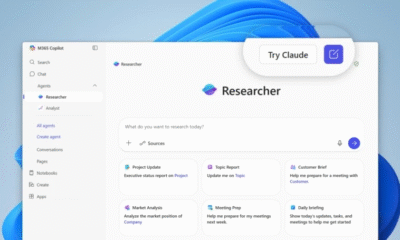AI
Enhancing AI Apps with Real-Time Google Maps Integration: A Game-Changer for Developers

Google has introduced a groundbreaking feature for third-party developers working with its Gemini AI models that sets it apart from competitors like OpenAI and Anthropic. This feature, known as “grounding with Google Maps,” allows developers to integrate Google’s AI reasoning capabilities with real-time geospatial data from Google Maps. This integration enables applications to provide detailed, location-specific responses to user queries, such as business hours, reviews, and the ambiance of specific venues. With access to data from over 250 million locations, developers can now create more intelligent and responsive location-aware experiences.
This new feature is particularly beneficial for applications where proximity, real-time information, or location-specific personalization are crucial, such as local search, delivery services, real estate, and travel planning. By leveraging the user’s location data, developers can enhance the quality of responses by incorporating latitude and longitude information into their requests.
By seamlessly integrating real-time and historical Maps data into the Gemini API, Google empowers applications to generate accurate and contextually rich location-specific responses that are only possible through its mapping infrastructure.
This feature is accessible through Google AI Studio, where developers can experiment with a live demo powered by the Gemini Live API. Supported models for grounding with Google Maps include Gemini 2.5 Pro, Gemini 2.5 Flash, Gemini 2.5 Flash-Lite, and Gemini 2.0 Flash.
One impressive demonstration showcased how a user inquired about Italian restaurant recommendations in Chicago. The AI assistant, utilizing Maps data, provided top-rated options, corrected a misspelled restaurant name, and located the correct venue with precise business details. Developers can also embed a Google Maps widget in their app’s interface to display photos, reviews, and other relevant content from Google Maps.
The Maps grounding tool caters to various practical use cases across industries, such as itinerary generation for travel apps, personalized local recommendations for real estate platforms, and detailed location queries for applications seeking specific information about venues.
Developers are advised to use the tool judiciously to ensure optimal performance and cost-effectiveness. The pricing for this feature starts at $25 per 1,000 grounded prompts.
Furthermore, developers can combine Grounding with Google Maps with Grounding with Google Search to enhance contextual responses. While the Maps tool provides factual data like addresses and hours, the Search tool adds broader context from web content such as news and event listings.
To ensure transparency and trust in user-facing applications, the API returns structured metadata that developers can use to build inline citations or verify AI-generated outputs. Google mandates clear attribution of Maps-based sources and linking back to the original source.
For technical teams integrating this capability, Google recommends passing user location context when available, displaying Google Maps source links, enabling the tool only when geographic context is relevant, and monitoring latency to disable grounding when necessary.
Grounding with Google Maps is now globally available through the Gemini API, with restrictions in certain territories and limitations on emergency response use cases. This feature underscores Google’s commitment to expanding the capabilities of the Gemini API and empowering developers to create AI-driven applications that are deeply connected to the world around them.
-

 Facebook3 days ago
Facebook3 days agoWarning: Facebook Creators Face Monetization Loss for Stealing and Reposting Videos
-

 Facebook4 days ago
Facebook4 days agoInstaDub: Meta’s AI Translation Tool for Instagram Videos
-

 Facebook3 days ago
Facebook3 days agoFacebook Compliance: ICE-tracking Page Removed After US Government Intervention
-

 Video Games4 days ago
Video Games4 days agoGoku Takes on the Dragon Ball FighterZ Arena
-

 Video Games5 days ago
Video Games5 days agoTekken 8: Rise of the Shadows
-

 Amazon5 days ago
Amazon5 days agoNeil Young Takes a Stand: Pulling Music from Amazon in Protest of Jeff Bezos’ Support for Trump
-

 Microsoft3 days ago
Microsoft3 days agoMicrosoft Integrates Anthropic’s Claude AI Models into 365 Copilot: A Deepening Relationship with OpenAI
-

 Cars3 days ago
Cars3 days agoRevving into the Future: Ferrari’s Plan to Unleash 20 New Models, Including Electric Vehicles, by 2030



























